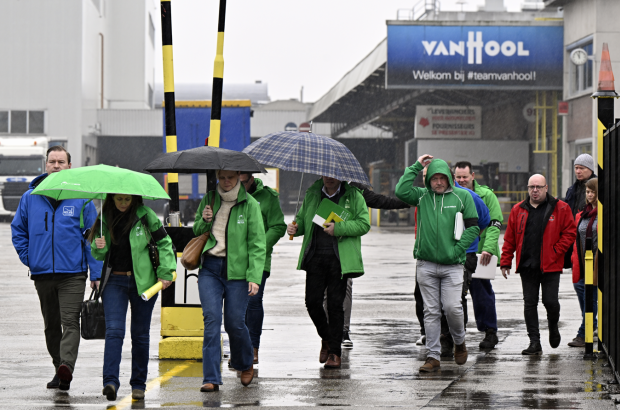- Daily & Weekly newsletters
- Buy & download The Bulletin
- Comment on our articles
Van Hool bus company to lay off 1,100 workers by 2028
Flanders bus construction company Van Hool will say goodbye to more than 1,100 jobs in four years, it announced at an extraordinary committee meeting.
Out of 2,494 posts at present, only 1,378 will remain in 2028 – with some 834 employees to go this year.
“This is probably the most difficult piece of news that we have had to communicate to our collaborators in Van Hool’s 75-year history,” said the company’s spokesperson Dirk Snauwaert.
The news comes after Van Hool’s board said it would relocate much of its production activity from Belgium to North Macedonia. The business is faced with significant debts, its savings have diminished and there is a lack of outside help.
Moreover, as part of Van Hool’s restructuring plan, to avoid bankruptcy, the company must also find some €45 million by 31 March.
“The coffers are empty,” trade unions said. And as well as this €45 million, the business must also find €60 million for severance/redundancy payments.
Van Hool’s bosses say the restructuring plan would offer perspectives for the remaining workers, as well as some 3,000 posts indirectly affected.
“If all parties concerned, the workers, the unions, but also the Flemish government and the banks are ready to support us, there will be good opportunities in future for the 1,400 workers,” Snauwaert assured the meeting.
Van Hool’s bosses insisted that this "strategic reorientation" and recovery plan will lead to a "sustainable future", saying that: "Public transport as a market sector will be approached more selectively." In other words, Van Hool wants to focus on vehicles with slightly higher added value and quality than city buses.
"We understand the impact of this plan on our employees and their families, and it is difficult for us to take this step,” said Van Hool joint chief executive Marc Zwaaneveld.
“However, given the emergency situation the company finds itself in, it is really necessary to take these measures.”
He explained that the Covid-19 crisis, inflation and the problems of procuring parts globally to manufacture the vehicles were major factors provoking the decision to lay off staff.
But workers and unions see it differently. “This really is a very sad piece of news,” said one Van Hool employee, Elke Gotemans.
“Several families work here together. There are many people who come from the region. So it’s a big blow, not only for the workers employed here, but also for the middlemen and the suppliers,” explained Kim Samison from the ACV trade union.
The announcement of job cuts was a surprise, “both in its magnitude and in the speed in which it must be done, especially with the 31 March deadline,” added Hans Van Eerdewegh of socialist union ABVV/FGTB.
Like the Van Hool boss, Samison listed several factors resulting in this depressing state of affairs: “On the one hand, we had the coronavirus crisis. At that time, public life came to a standstill. Van Hool’s order book also collapsed in the coach segment,” he said.
Increased costs linked to the energy crisis and the fact that the Flemish transport company De Lijn placed a large order for buses with Chinese manufacturers BYD instead of with the Antwerp brand were other blows.
The beleaguered bus company is now hoping that the Flemish government and the banks will provide financial aid.
Following a first meeting on 11 March with BNP Paribas Fortis, KBC, Belfius and ING, a spokesperson for Flanders minister-president Jan Jambon (from the nationalist N-VA party) said that the two parties would continue to examine the restructuration dossier.
An assessment of the situation will be made by an expert in the next two weeks, he added: “The key question is can we find a solid business case?”
According to Flemish economy, innovation, work, social economy and agriculture minister Jo Brouns (CD&V), the banks want to look at this dossier “positively”, but they do not deny that the challenge is “particularly big”.
As for potential government aid, Brouns does not see this coming any time soon, unless a private partner is brought in to help.
Photo: Eric Lalmand/Belga


















